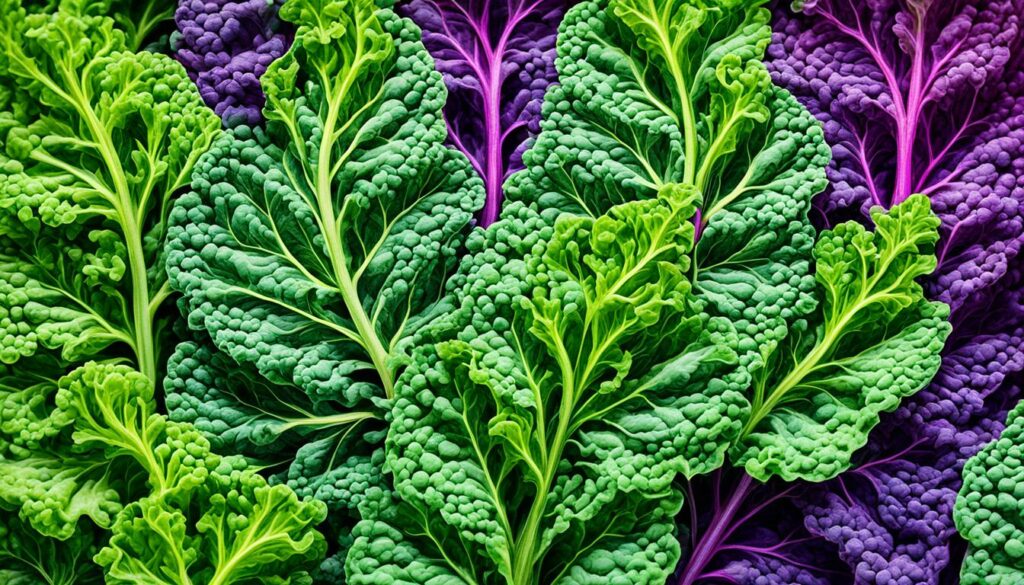Mustard greens have been celebrated for their incredible health benefits in various cultures for centuries. These leafy greens are not only a delicious addition to your meals but are also packed with essential nutrients that promote overall well-being.
In this article, we will explore the numerous health benefits of eating mustard greens, delve into their nutritional profile, and learn how to incorporate them into your diet.
Key Takeaways:
- Mustard greens are a nutrient powerhouse, rich in vitamins like vitamin A, vitamin C, and vitamin K.
- They contain important minerals such as calcium, iron, potassium, and magnesium, which are essential for optimal health.
- Mustard greens are loaded with antioxidants that protect against cell damage and contribute to a lower risk of chronic diseases.
- Including mustard greens in your diet can support good heart function, improve bone health, enhance brain function, and promote better eye health.
- These versatile greens can be incorporated into your meals through various recipes and cooking methods.
Nutritional Profile of Mustard Greens
When it comes to nutrition, mustard greens are a powerhouse of essential vitamins, minerals, and antioxidants. Despite being low in calories, they pack a hefty punch in terms of health benefits. Let’s take a closer look at the remarkable nutritional profile of mustard greens.
Vitamins
Mustard greens are loaded with vitamins that are vital for overall health. They are particularly rich in:
- Vitamin A: Mustard greens are an excellent source of vitamin A, which contributes to healthy vision, boosts the immune system, and supports cell growth and development.
- Vitamin C: With high levels of vitamin C, mustard greens help strengthen the immune system, aid in collagen production, and act as an antioxidant to protect against free radicals.
- Vitamin K: Mustard greens are one of the best plant sources of vitamin K, which plays a crucial role in blood clotting, bone health, and preventing heart disease.
Minerals
In addition to vitamins, mustard greens are packed with essential minerals necessary for optimal health:
- Calcium: Mustard greens contain calcium, a mineral vital for strong bones and teeth, muscle function, and nerve transmission.
- Iron: Iron is essential for carrying oxygen throughout the body, and mustard greens provide a good plant-based source of this mineral.
- Potassium: Mustard greens are rich in potassium, an electrolyte that helps maintain normal blood pressure, heart function, and fluid balance.
- Magnesium: Magnesium is involved in over 300 biochemical reactions in the body, and mustard greens provide a good amount of this mineral to support various bodily functions.
Antioxidants
Mustard greens are a treasure trove of antioxidants, including flavonoids, beta carotene, and lutein:
- Flavonoids: These antioxidants help protect the body against chronic diseases by neutralizing harmful free radicals and reducing inflammation.
- Beta Carotene: Beta carotene, which the body converts into vitamin A, is a powerful antioxidant that supports skin health, boosts immunity, and promotes eye health.
- Lutein: Lutein is an antioxidant that helps shield the eyes from damage caused by blue light and oxidative stress, reducing the risk of age-related macular degeneration.
To visualize the impressive nutritional profile of mustard greens, here’s a table summarizing their key vitamins, minerals, and antioxidants:
| Nutrient | Amount per 100g |
|---|---|
| Vitamin A | 3546 IU |
| Vitamin C | 70 mg |
| Vitamin K | 592 mcg |
| Calcium | 120 mg |
| Iron | 1.5 mg |
| Potassium | 452 mg |
| Magnesium | 36 mg |
| Flavonoids | Varies |
| Beta Carotene | 4200 mcg |
| Lutein | 47 mcg |
With their abundance of vitamins, minerals, and antioxidants, it’s clear that mustard greens are not only delicious but also highly nutritious. Including these greens in your diet can provide an array of health benefits, making them a valuable addition to any meal plan.
Lower Risk of Chronic Disease
Mustard greens are not only delicious but also offer a range of health benefits, including a lower risk of chronic disease. This is primarily due to the presence of powerful phytonutrients and antioxidants in these leafy greens.
Antioxidants are compounds that protect our cells from damage caused by free radicals. The antioxidants found in mustard greens, such as vitamin C, vitamin A, and beta carotene, can neutralize these harmful molecules and help maintain the body’s overall health.
By enhancing the body’s immune defenses, mustard greens antioxidants can reduce the risk of chronic diseases. They play a vital role in preventing conditions like arthritis, autoimmune disorders, heart problems, and even cognitive decline.
Studies have also shown that mustard greens contain beneficial compounds called glucosinolates. These compounds have shown potential in fighting cancer cells and preventing tumor formation. While further research is needed in this area, the presence of glucosinolates in mustard greens makes them a promising food for cancer prevention.
Mustard greens are a powerhouse of antioxidants, which protect cells from damage and reduce the risk of chronic diseases like arthritis, heart problems, and even cancer. Incorporating mustard greens into your diet can have significant long-term health benefits.
To summarize, mustard greens offer a natural way to lower the risk of chronic disease. The presence of antioxidants and glucosinolates in these greens provides protection against oxidative stress, promotes a healthy immune system, and reduces the risk of various health conditions.
| Health Benefits of Mustard Greens | Health Conditions |
|---|---|
| Rich in antioxidants | Protects against chronic diseases |
| Packed with glucosinolates | Potential cancer prevention |
| Enhances immune defenses | Reduces the risk of arthritis, autoimmune disorders, and cognitive decline |
Support for Good Heart Function
Regular consumption of green leafy vegetables like mustard greens has been shown to significantly reduce the risk of heart disease. Mustard greens are packed with nutrients that promote good heart health and lower the risk of heart problems and stroke.
One significant nutrient found in mustard greens is vitamin K. This vitamin plays a vital role in blood clotting and supports optimal heart function. Additionally, mustard greens are known for their ability to lower cholesterol levels and keep arteries clear from buildup, which is crucial for maintaining a healthy heart.
The combination of vitamin K and other heart-healthy compounds in mustard greens makes them a great addition to a heart-healthy diet. Add them to your meals to support good heart function and improve your overall cardiovascular health.
Better Bone Health
Mustard greens are not only beneficial for heart health but also for maintaining healthy bones. They are high in vitamin K, which plays a crucial role in bone health and can reduce the risk of bone mineral abnormalities and osteoporosis.
Studies have shown that getting enough vitamin K in your diet can improve bone strength and protect against fractures. Additionally, mustard greens are low in calories and can be included in a weight loss diet.
Benefits of Vitamin K for Bone Health
Vitamin K is essential for proper bone mineralization and the production of osteocalcin, a protein that helps bind calcium to the bone matrix. Adequate intake of vitamin K can improve bone density and reduce the risk of fractures, especially in postmenopausal women.
| Vitamin K Benefits for Bone Health | How It Helps |
|---|---|
| Improved bone density | Vitamin K promotes the deposition of calcium in the bones, leading to increased bone density and strength. |
| Reduced risk of fractures | By enhancing the production of osteocalcin, vitamin K helps maintain bone integrity and reduce the risk of fractures. |
| Prevention of bone mineral abnormalities | Vitamin K plays a crucial role in preventing bone mineral abnormalities, such as osteopenia and osteoporosis. |

“Including mustard greens in your diet can provide a natural source of vitamin K, promoting better bone health and reducing the risk of bone-related conditions.”
Improved Eye Health
Mustard greens are a powerhouse of vitamins and minerals that promote overall health, including the health of your eyes. One of the key nutrients found in mustard greens is lutein, a type of carotenoid that plays a vital role in maintaining healthy vision.
Lutein acts as a natural filter, protecting the retina from oxidative damage and harmful blue light. It also helps prevent age-related macular degeneration (AMD), a leading cause of vision loss in older adults. Research suggests that consuming foods rich in lutein, such as mustard greens, may help reduce the risk of developing AMD.
Additionally, mustard greens are a good source of zeaxanthin, another carotenoid that works synergistically with lutein to support eye health. Zeaxanthin is present in the macula of the eye and helps protect against oxidative stress caused by exposure to UV light.
Including mustard greens in your diet can provide your eyes with the essential vitamins and antioxidants they need to stay healthy and function optimally. Whether you enjoy them raw in salads or cooked in various dishes, adding mustard greens to your meals is a delicious way to support your eye health.
Enhanced Brain Function
Research suggests that mustard greens are not only beneficial for physical health but also contribute to enhanced brain function. Mustard greens contain a variety of antioxidants, including beta carotene and lutein, which have been found to benefit brain tissue and support better cognitive performance.
These antioxidants play a vital role in protecting brain cells from oxidative stress, which can lead to mental decline and impaired brain functioning. By including mustard greens in your diet, you can provide your brain with essential nutrients that promote optimal cognitive health.
Furthermore, mustard greens are a rich source of B vitamins, which are known to play a significant role in brain health. These vitamins, such as thiamine, riboflavin, and folate, contribute to the production and maintenance of brain chemicals that regulate mood, cognition, and memory.
Consuming mustard greens regularly can help ensure a sufficient intake of these B vitamins, supporting overall brain health.

Adding mustard greens to your meals can be a flavorful and nutritious way to boost brain function and protect against age-related cognitive decline. Incorporate them into salads, stir-fries, soups, or even blend them into smoothies for a refreshing twist.
By harnessing the power of mustard greens’ antioxidants and vitamins, you can nourish your brain and support optimal cognitive function.
Conclusion
Mustard greens are truly a nutritional powerhouse that offers a wide array of health benefits.
Packed with vitamins, minerals, and antioxidants, they promote heart health, lower the risk of chronic diseases, improve bone strength, enhance eye health, and support brain function. Including mustard greens in your diet can be a delicious and nutritious way to boost overall health and well-being.
One of the key advantages of mustard greens is their rich antioxidant content. These antioxidants help protect cells from damage caused by free radicals, reducing the risk of chronic diseases such as arthritis, autoimmune disorders, and cognitive decline.
In addition to their antioxidant properties, mustard greens provide vital nutrients that support heart health and bone strength. They are a great source of vitamin K, which plays a crucial role in maintaining healthy bones and preventing conditions like osteoporosis. Moreover, their high fiber content aids in digestion and may even assist in weight loss efforts.
So, whether you enjoy them in salads, sautés, or smoothies, make sure to incorporate mustard greens into your daily meals to reap the numerous health benefits they offer. Start exploring different recipes and cooking methods to enjoy the nutritional goodness of this leafy green vegetable.
FAQ
What are the health benefits of eating mustard greens?
Mustard greens offer a range of health benefits including lower risk of chronic disease, support for good heart function, better bone health, improved eye health, and enhanced brain function.
What is the nutritional profile of mustard greens?
Mustard greens are low in calories but high in fiber and micronutrients. They are a rich source of vitamins such as vitamin A, vitamin C, and vitamin K. They also contain minerals like calcium, iron, potassium, and magnesium.
How do mustard greens help lower the risk of chronic disease?
Mustard greens contain powerful phytonutrients and antioxidants that protect cells from damage caused by free radicals. These antioxidants can enhance immune defenses and reduce the risk of chronic diseases like arthritis, autoimmune disorders, heart problems, and cognitive decline.
How do mustard greens support good heart function?
Regular intake of green leafy vegetables like mustard greens significantly reduces the risk of heart disease. Mustard greens contain nutrients that help lower cholesterol levels and keep arteries clear from buildup, reducing the risk of heart problems and stroke. They are also a rich source of vitamin K, which helps with blood clotting and supports heart function.
How do mustard greens contribute to better bone health?
Mustard greens are high in vitamin K, which plays a crucial role in bone health and can reduce the risk of bone mineral abnormalities and osteoporosis. Getting enough vitamin K in your diet can improve bone strength and protect against fractures.
How do mustard greens improve eye health?
Mustard greens are rich in antioxidants like lutein and zeaxanthin, which are essential for maintaining healthy eyes and preventing age-related vision loss. These antioxidants protect the retina from oxidative damage and filter out harmful blue light.
How do mustard greens enhance brain function?
The antioxidants found in mustard greens, such as beta carotene and lutein, can benefit brain tissue and support better cognitive performance. Mustard greens also contain several B vitamins, which play a role in brain health.
What are the health benefits of eating mustard greens?
Mustard greens are a superfood with a range of health benefits. They are packed with vitamins, minerals, and antioxidants that support heart health, lower the risk of chronic disease, improve bone and eye health, and enhance brain function.




